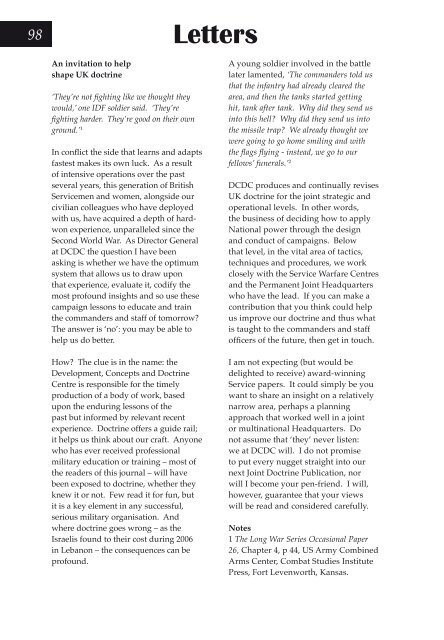REVIEW - Royal Air Force Centre for Air Power Studies
REVIEW - Royal Air Force Centre for Air Power Studies
REVIEW - Royal Air Force Centre for Air Power Studies
You also want an ePaper? Increase the reach of your titles
YUMPU automatically turns print PDFs into web optimized ePapers that Google loves.
98 Letters<br />
An invitation to help<br />
shape UK doctrine<br />
‘They’re not fighting like we thought they<br />
would,’ one IDF soldier said. ‘They’re<br />
fighting harder. They’re good on their own<br />
ground.’ 1<br />
In conflict the side that learns and adapts<br />
fastest makes its own luck. As a result<br />
of intensive operations over the past<br />
several years, this generation of British<br />
Servicemen and women, alongside our<br />
civilian colleagues who have deployed<br />
with us, have acquired a depth of hardwon<br />
experience, unparalleled since the<br />
Second World War. As Director General<br />
at DCDC the question I have been<br />
asking is whether we have the optimum<br />
system that allows us to draw upon<br />
that experience, evaluate it, codify the<br />
most profound insights and so use these<br />
campaign lessons to educate and train<br />
the commanders and staff of tomorrow?<br />
The answer is ‘no’: you may be able to<br />
help us do better.<br />
How? The clue is in the name: the<br />
Development, Concepts and Doctrine<br />
<strong>Centre</strong> is responsible <strong>for</strong> the timely<br />
production of a body of work, based<br />
upon the enduring lessons of the<br />
past but in<strong>for</strong>med by relevant recent<br />
experience. Doctrine offers a guide rail;<br />
it helps us think about our craft. Anyone<br />
who has ever received professional<br />
military education or training – most of<br />
the readers of this journal – will have<br />
been exposed to doctrine, whether they<br />
knew it or not. Few read it <strong>for</strong> fun, but<br />
it is a key element in any successful,<br />
serious military organisation. And<br />
where doctrine goes wrong – as the<br />
Israelis found to their cost during 2006<br />
in Lebanon – the consequences can be<br />
profound.<br />
A young soldier involved in the battle<br />
later lamented, ‘The commanders told us<br />
that the infantry had already cleared the<br />
area, and then the tanks started getting<br />
hit, tank after tank. Why did they send us<br />
into this hell? Why did they send us into<br />
the missile trap? We already thought we<br />
were going to go home smiling and with<br />
the flags flying - instead, we go to our<br />
fellows’ funerals.’ 2<br />
DCDC produces and continually revises<br />
UK doctrine <strong>for</strong> the joint strategic and<br />
operational levels. In other words,<br />
the business of deciding how to apply<br />
National power through the design<br />
and conduct of campaigns. Below<br />
that level, in the vital area of tactics,<br />
techniques and procedures, we work<br />
closely with the Service Warfare <strong>Centre</strong>s<br />
and the Permanent Joint Headquarters<br />
who have the lead. If you can make a<br />
contribution that you think could help<br />
us improve our doctrine and thus what<br />
is taught to the commanders and staff<br />
officers of the future, then get in touch.<br />
I am not expecting (but would be<br />
delighted to receive) award-winning<br />
Service papers. It could simply be you<br />
want to share an insight on a relatively<br />
narrow area, perhaps a planning<br />
approach that worked well in a joint<br />
or multinational Headquarters. Do<br />
not assume that ‘they’ never listen:<br />
we at DCDC will. I do not promise<br />
to put every nugget straight into our<br />
next Joint Doctrine Publication, nor<br />
will I become your pen-friend. I will,<br />
however, guarantee that your views<br />
will be read and considered carefully.<br />
Notes<br />
1 The Long War Series Occasional Paper<br />
26, Chapter 4, p 44, US Army Combined<br />
Arms Center, Combat <strong>Studies</strong> Institute<br />
Press, Fort Levenworth, Kansas.

















